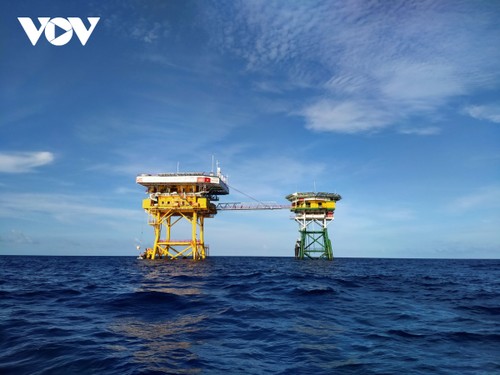 DK1 Platform (Photo: VOV) DK1 Platform (Photo: VOV) |
Throughout its history of national construction and defense, Vietnam has always affirmed the importance of safeguarding national sovereignty over the seas and islands. Visiting officers and soldiers of the Vietnam People's Navy in 1961, President Ho Chi Minh said: "In the past, we only had night and forest, today we have day, sky, and sea. Our coastline is long and beautiful. We must safeguard it."
Crucial importance of seas, islands
The seas and islands are an inseparable and inviolable part of Vietnam's sacred sovereignty. Protecting the Fatherland, resolutely and persistently fighting to firmly defend sovereignty, and ensuring national security, safety, and interests in the seas and islands are the main tasks of the entire political system and people in protecting socialist Vietnam.
The Party has over the past years improved its system for defending sea and island sovereignty. In 2007, the Party Central Committee adopted Resolution 09 on Vietnam’s Maritime Strategy until 2020, which aims to make Vietnam a strong country at sea and rich from the sea, and ensure national sovereignty and sovereign rights to the seas and islands. In 2018, the Party Central Committee issued Resolution 36 on the “Strategy for sustainable development of Vietnam's marine economy until 2030 with Vision to 2045". It determined that Vietnam must become a country strong at sea and rich from the sea, with sustainable development, prosperity, security, and safety and that sustainable development of the marine economy must go hand in hand with ensuring national defense and security, and maintaining independence, sovereignty, and territorial integrity.
At the 13th National Party Congress in 2021, the Communist Party of Vietnam reiterated the need to resolutely and persistently fight to firmly safeguard national independence, sovereignty, unity, territorial integrity, aviation, and navigation and maintain a peaceful and stable environment for development.
These documents show that the Vietnamese Party and State are deeply aware of the crucial importance of the seas and islands, which is the basis for implementing activities to protect sovereignty over seas and islands.
Respecting law and principles of international relations
Vietnam always complies with and respects the provisions of law and principles of international relations in defending national sovereignty over the seas and islands.
Vietnam signed the 1982 United Nations Convention on the Law of the Sea (UNCLOS 1982) and insists on resolving problems that arise through peaceful means on the basis of equality and mutual respect and finding long-term solutions that meet the legitimate interests of all parties involved.
Vietnam has consistently pursued peace in international forums through exchanging delegations at all levels, practicing restraint, and not taking provocative actions that complicate the situation. Vietnam has developed a system of peaceful measures to resolve disputes through diplomacy, negotiation, investigation, and mediation, through international organizations, and through signing bilateral and multilateral agreements. Vietnam has attached importance to building strategic trust with partners, promoting multilateral cooperation in ensuring security, scientific and technological research, and preventing and combating crimes at sea to maintain a sea of peace, stability, friendship, cooperation, and development.
According to the 2019 Defense White Paper, Vietnam has signed many legal documents on maritime borders with neighboring countries. They include the Agreement on Historic Waters signed with Cambodia in 1982, the Agreement on maritime boundary delimitation in the Gulf of Thailand signed with Thailand in 1997, the Agreement on delimitation of territorial sea, exclusive economic zone and continental shelf in the Gulf of Tonkin signed with China in 2000, the Agreement on fisheries cooperation in the Gulf of Tonkin signed with China in 2000, and the Agreement on basic principles guiding the settlement of maritime issues signed with China in 2011.
Vietnam is an independent country, with sovereignty, unity and territorial integrity, including land, airspace, seas and islands. Safeguarding the fatherland and the sovereignty of its seas and islands on the basis of respecting international law is an important factor for Vietnam to grow sustainably.